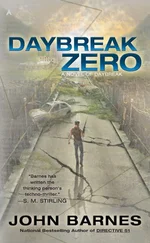Except that if Hardshaw goes for it, when the SecGen says something is happening out there in the global environment, she won’t have the foggiest idea whether or not he’s telling the truth. And the major area in which the UN has been restricting national sovereignty, for the past twenty years, has been in global environmental questions.
She can even see it in Rivera’s lights, when she tries; UNESCO and its many spinoffs don’t supply the quality of information that he needs, and he ends up acquiring it mainly from the scientific agencies of the Big Five. And if you were the SecGen, Brittany Lynn, you’d have to wonder all the time if maybe something was being put over on you, or something was being hidden.
But she isn’t the SecGen, and it’s not her lookout. She stretches, smooths her skirt, picks up the phone, and tells them to get Harris Diem and bring him in—she knows he’s been at his desk for at least an hour by now.
The irony of it all, she thinks, is that in her seven years of struggle with the UN she’s been forced to make the Federal government speak with just one voice, made it a better implement for governing than the country has ever had before—and she has, now, even less real authority than the Presidents between Jackson and Lincoln.
And the deeper irony is that as she has extended her authority, she has diminished her ability to get the truth, instead of what people think she wants to hear. This document on her desk is the result of that, and she’s too smart not to see the chickens returning to roost.
She can’t tell what the people at NOAA think the release of so much methane will do, because they were trying to tell her whatever would make things go smoothly for NOAA.
And just this once, she wants the truth.
If you’re going to get all worked up about what’s true and what’s not, you’re never gonna be President like I’m grooming you for, Brittany Lynn, her father used to say, once she’d gotten old enough to start to catch him out in all those lies—the lost Spanish city somewhere in the Hoodoo River gorge, the aliens he had met on the road to Sand Point, Bigfoot, that the house would be beautiful when it was finished, and he was going to stop drinking for his little girl.
This job isn’t quite the fun she might have hoped for, back then, but it still beats hell out of spending her life behind a cash register at a McDonald’s in Boise. She was just kind of wondering, for a minute there, by how much?
The soft chime tells her Harris is on his way in. She composes herself, goes back to the desk, flips the report open to a random page. When he comes in, she skips the greeting and starts with, “Harris, you greasy old hack, why in hell did you hand me a report that doesn’t say anything?”
“Because, boss,” he says, setting down his briefcase and leaning across the desk at her, “we don’t know anything.”
They laugh because they have been friends for twenty years. Nothing is funny but each is glad the other is here.
Yeats fussed about things falling apart and the center not being able to hold. What really happened was that the center ceased to exist altogether.
It fell into nonexistence gradually, in the kind of grim retreat and perpetual compromise that marked the last two centuries of Rome.
Eisenstein found out that all you had to do was cut from the thing to the face that seemed to be seeing it, take the pieces of the story and put them together with a simple splice, and it would stick together just as if some Dickensian narrator had said “And so, dear reader…”; the storyteller was no longer at the center of the story.
Einstein found out that you could pick any old place to be the center.
Gertrude Stein found out that the more times rose was rose, the less it had to do with anything pink and sweet-smelling, and the freer it was to be like Bums’s luve, or like every other rose.
RAND Corporation demonstrated that in the event of a nuclear war, a state without a head cannot be decapitated, and gray corporate gnomes transformed into the playful sprites of the nets.
Hitler, Stalin, Roosevelt, and Churchill tried to rebuild the center, but to do it they had to let radios into everyone’s house, and there is no point in being Pope if you’ve got to touch the beggars personally; the increased contact of the center with the periphery only hastened its dissolution.
The old centralized Communist Party was so ineffective at opposing the Korean War that many Americans didn’t know there was a war, but thirty thousand mimeographs and two thousand college radio stations carried the struggle against the Vietnam War into the farthest corners of the country, and while the reporters from the centralized broadcasting services interviewed the supposed heads of the supposedly national supposed organizations, the ground shifted under them. By 1980, the slogan was “Think Globally, Act Locally,” and few were bothering with the global part. Even the Department of Defense came up with AirLand Battle, which you might call cooperative local-action violence.
By 2028, things have gone farther. The center is wherever you are standing.
When Harris Diem gets done talking to the President, he’s tired, and it’s still early in the morning. Another ten-minute conversation, another major chunk of history, he thinks to himself. The hardest thing about his memoirs is going to be explaining to people that it really happened that way, all the time—you walked into Brittany Lynn Hardshaw’s office, she asked you six questions, and you suddenly had orders to change all of American history.
Assuming it works.
He thinks about it, rubbing his temples at his desk, rolling and stretching his neck. He will need a reliable fall guy, and there’s hardly a better one than Henry Pauliss. He’ll need to make elaborate arrangements to covertly monitor about forty completely loyal NOAA people. That’s not a problem either.
He needs to go spend some time in his basement. He hasn’t in weeks….
Time for it tonight if he wants to. Interesting phrase, “wants to.” If his house burned down tomorrow and everything hidden down there were destroyed, he would probably weep with relief… until that buzzing started at the base of his skull, and there was no relief possible for that.
He can hear it now, like a doorbell in a dream: no hallway ever leads to the door, and you know that when you open the door something will kill you… and you cannot do anything except endlessly search the halls for the door, so that you can open it.
Harris Diem sighs. Whenever things get fraught like this, the buzzing starts, and it’s as if the basement calls him, begs him to come down. Back when the Afropean Expulsion happened, when the Navy stood off Jutland and Admiral Tranh was calling every three hours to ask for more Marines, more air cover, and more space cover, because if shooting started he didn’t think he could hold back his local commanders and there was going to be war… that whole long week, the buzz was like a blade cutting through his scalp. And when he had finally scratched the itch, it had left him so sick that he very nearly torched his own house. He could have pretended he did it for the insurance and resigned in disgrace. He should have done it. Someday he will.
Right now, the boss needs him. As soon as this crisis is over… he’ll go down to the basement. Then he’ll think of some way to get it all over with for good.
It’s a promise he’s made himself many times before.
The biggest problem with zipline is that it’s like taking an elevator to everywhere; there is a window you can look out of, but since the car moves at four hundred miles per hour, they’ve got it running between high, fenced earth berms most of the way, so there’s nothing to see, and on the rare occasions when it shoots across a gorge or goes up to an elevated roadbed, the zipline is moving so fast that most people become ill. So after a few times when you’re a little kid, you don’t unshutter the window.
Читать дальше












